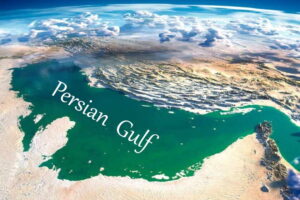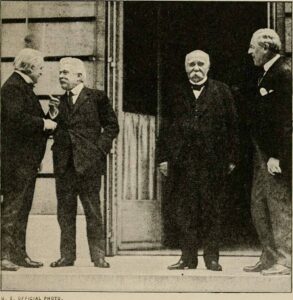ایالات متحده آمریکا و انگلستان پس از جنگ جهانی اول- پیروزی بدون صلح 1920-1917
پاورقی ها:
1. Spring-Rice to Balfour, 7Dec. 1917, in Robert H. Ferrell, Woodrow Wilson and World War I, 1917-1921 (New York: Harper and Row, 1985), p. 46.
2. Dimbleby, BBC 1 interviews in New Ulm. See also Frederick C. Luebke, Bonds of Loyalty: German-Americans and World War I (De Kalb, Illinois: Northern Illinois University Press, 1974), esp. ch. 8.
3. Wilson to House, 21 July 1917, The Papers of Woodrow Wilson, ed. Arthur S. Link, et al. (Multi-volume edition, still in progress, Princeton: Princeton University Press, 1966- ), vol. 43, p. 238.
4. Senator Thomas S. Martin, in David M. Kennedy, Over Here: The First World War and American Society (New York: Oxford University Press,1980), p. 144.
5. Dimbleby, BBC I interview with Winston Roche.
6. Dimbleby, BBC I interview with William Bruder.
7. Dimbleby – Roche interview.
8. David F. Trask, Captains and Cabinets: Anglo-American Naval Relations, 1917-1918 Columbia, Missouri: University of Missouri Press, 1972), P. 55.
9. Dimbleby, BBC I interview with ‘Tanky’ Taylor.
10. David R. Woodward, ‘Did Lloyd George Starve the British Army of Men Prior to the German Offensive of 21 March 1918?’, The Historical Journal, vol. 27 (1984), p. 250.
11. Robert Blake, ed., The Private Papers of Douglas Haig, 19I4-1918 (Lon-don: Eyre and Spottiswood, 1952), p. 307, diary for 1 May 1918.
12. Fourteen Points, 8 Jan. 1918, Wilson, Papers, vol. 45, Pp. 534-9.
13. Smuts in Imperial War Cabinet, 14 Aug. 1918, David R. Woodward, Lloyd George and the Generals (Newark, Delaware: University of Delaware Press, 1983), p. 328.
14. Admiralty memo for War Cabinet, Dec. 1918, in V. H. Rothwell, British War Aims and Peace Diplomacy, 1914-1918 (Oxford: Clarendon Press,1971), P. 258
I5. House, diary, 4 Nov. 1918, Col. Edward M. House papers (Sterling Library, Yale University).
16. Remarks on 29 Oct. 1918, in Sterling Kernek, Distractions of Peace during War: The Lloyd George Government’s Reactions to Woodrow Wilson, December 1916 to November 1918 (Philadelphia: American Philosophical Society Transactions, 1975), P. 104.
17. Dimbleby, BBC 1 interview with Edith Sowerbutts.
18. John Maynard Keynes, The Economic Consequences of the Peace (1919) in The Collected Writings of John Maynard Keynes, vol. II (London: Mac-millan, 1971), p. 24.
19. Dr Cary Grayson, diary, 27 Dec. 1918, in Wilson, Papers, vol. 53, Р. 521.
20. David Lloyd George, The Truth about the Peace Treaties (London: Victor Gollancz, 1938), vol. I, p. 181.
21. Quoted in Lloyd C. Gardner, Safe for Democracy: The Anglo-American Response to Revolution, 1913-1923 (New York: Oxford University Press, 1904), pp. 2-3.
22. A. Lentin, Lloyd George, Woodrow Wilson and the Guilt of Germany: An Essay in the Pre-History of Appeasement (Leicester: Leicester University Press, 1984), pp. 16-29.
23. Harold Nicolson, Peacemaking, 1919 (London: Constable, 1933), p. 152.
24. Michael L. Dockrill and J. Douglas Goold, Peace without Promise: Britain and the Paris Peace Conferences, 1919-23 (London: Batsford, 1981), P. 59.
25. Wilson to House, 3 March 1919, in Wilson, Papers, vol. 55, P. 392.
26. Sen. Frank Brandegee, in Ralph Stone, The Irreconcilables: The Fight against the League of Nations (New York: W. W. Norton, 1973), р. 63.
27. Charles Seymour, The Intimate Papers of Colonel House (4 vols, London: Ernest Benn, 1926-8), vol. 4, p. 405.
28. J. M. Keynes to Florence Keynes, I4 May 1919, The Collected Writings of John Maynard Keynes, ed. Elizabeth Johnson, vol. XVI (London: Macmillan, 1971), p. 458.
29. Peter Rowland, Lloyd George (London: Barrie and Jenkins, 1975), p. 495.
30. Alan J. Ward, Ireland and Anglo-American Relations, 1899-1921 (London: Weidenfeld and Nicolson, 1969), p. 176.
31. Philadelphia Irish Press, 24 May 1919, in Joseph P. O’Grady, ed., The Immigrants’ Influence on Wilson’s Peace Policies (Lexington: University of Kentucky Press, 1967), p. 77.
32. Woodrow Wilson, War and Peace: Presidential Messages, Addresses, and Public Papers, 1917-1924, eds Ray Stannard Baker and William E. Dodd (2 vols, New York: Harper and Brothers, 1927), vol. I, p. 640 (St Louis, 5 Sept. 1919), vol. II, pp. 52 (Sioux Falls, 8 Sept.) and 212 (Portland, 15 Sept.).
33. Thomas A. Bailey, Woodrow Wilson and the Great Betrayal (Chicago: Quadrangle Books, 1945), p. 185.
34. George W. Egerton, ‘Britain and the “Great Betrayal”: Anglo-American Relations and the Struggle for United States Ratification of the Treaty of Versailles, 1919-1920’, The Historical Journal, vol. 21 (1978), p. 911.
Pages: 1 2 3 4 5 6 7 8 9 10 11 12 13 14 15 16 17 18 19 20 21 22 23 24 25 26 27 28 29 30 31 32



